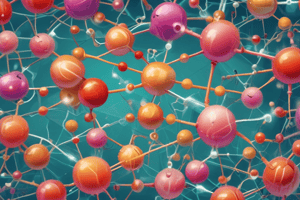Podcast
Questions and Answers
What is the systematic name for a C18 fatty acid with one double bond?
What is the systematic name for a C18 fatty acid with one double bond?
- Octadecane
- Octadecanoic acid
- Octadecadienoic acid
- Octadecatrienoic acid (correct)
How is a C18 fatty acid with no double bonds denoted?
How is a C18 fatty acid with no double bonds denoted?
- 18:0 (correct)
- Δ9
- C18:1 ω3
- 18:1 ω9
What does the symbol ∆ followed by a superscript number represent in the nomenclature of fatty acids?
What does the symbol ∆ followed by a superscript number represent in the nomenclature of fatty acids?
- Number of carbon atoms
- Position of a double bond (correct)
- Number of hydrogens
- Name of the parent hydrocarbon
What is the position of a double bond represented by if it is denoted as ω9?
What is the position of a double bond represented by if it is denoted as ω9?
What are the carbon atoms adjacent to the carboxyl carbon known as?
What are the carbon atoms adjacent to the carboxyl carbon known as?
How is a C18 saturated fatty acid called based on its parent hydrocarbon?
How is a C18 saturated fatty acid called based on its parent hydrocarbon?
What is the most abundant type of lipid in nature?
What is the most abundant type of lipid in nature?
Which process involves the hydrolysis of fats and oils into their constituents by alkali or enzyme?
Which process involves the hydrolysis of fats and oils into their constituents by alkali or enzyme?
What are triglycerides?
What are triglycerides?
What is the main difference between fats and oils?
What is the main difference between fats and oils?
What color are freshly prepared fats and oils?
What color are freshly prepared fats and oils?
What is the specific gravity of fats and oils?
What is the specific gravity of fats and oils?
Which type of triglyceride has three fatty acids of the same type connected to glycerol?
Which type of triglyceride has three fatty acids of the same type connected to glycerol?
What causes oils to be liquids at room temperature?
What causes oils to be liquids at room temperature?
What do freshly prepared fats and oils taste like?
What do freshly prepared fats and oils taste like?
Flashcards are hidden until you start studying
Study Notes
Fatty Acid Nomenclature
- A C18 fatty acid with one double bond is systematically named as oleic acid.
- A C18 fatty acid with no double bonds is denoted as stearic acid.
- The symbol ∆ followed by a superscript number indicates the position of the double bond in the fatty acid chain.
Double Bond Positioning
- A double bond denoted as ω9 is located nine carbons from the methyl end of the fatty acid.
Carbon Structure Terms
- Carbon atoms adjacent to the carboxyl carbon are known as alpha (α) and beta (β) carbons.
Saturated Fatty Acids
- A C18 saturated fatty acid is called stearic acid, based on its parent hydrocarbon, octadecan.
Types of Lipids
- Triglycerides are the most abundant type of lipid found in nature.
Hydrolysis Process
- The process that involves hydrolysis of fats and oils into their constituents by alkali or enzyme is known as saponification.
Triglycerides
- Triglycerides are composed of three fatty acids esterified to glycerol.
Fats vs. Oils
- The main difference between fats and oils is that fats are solid at room temperature, while oils are liquid.
Physical Properties
- Freshly prepared fats and oils appear yellow to light yellow in color.
- The specific gravity of fats and oils is typically less than that of water, making them less dense.
Types of Triglycerides
- A triglyceride with three fatty acids of the same type connected to glycerol is known as a simple triglyceride.
Liquid State of Oils
- Oils are liquid at room temperature due to the presence of unsaturated fatty acids, which prevent tight packing of molecules.
Taste Profile
- Freshly prepared fats and oils have a neutral to slightly fatty taste, without strong flavors.
Studying That Suits You
Use AI to generate personalized quizzes and flashcards to suit your learning preferences.




